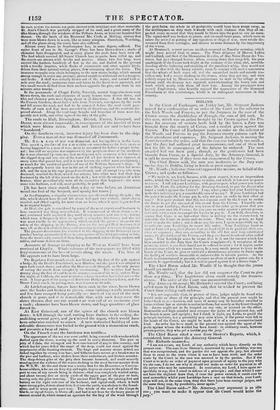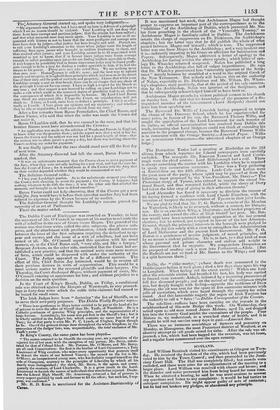IRELAND.
In the Court of Exchequer, on Friday last, Mr. Sergeant Jackson moved for a confirmation of an order of the Court on 'the solicitor to the Irish Woods and Forests, to pay the Jurymen in the ease of the Crown versus the Archbishop of Armagh, the sum of '201. each. In this case, which was an action brought by the Crown against the Pri- mate for recovery of certain lands held by the latter, a Jury was brought from the county of Cavan, and a verdict given against the Crown. The Court of Exchequer made an order on the solicitor of the Woods and Forests to pay the Jurymen twenty guineas each for their attendance and expenses. .1r. Sergeant Jackson, in moving the Court to confirm the order, said that the sum was infinitely too small— that the Jury. had suffered great inconvenience, and one of them had to=t his life in consequence of the fatigue he endured. The stun awarded had not been paid ; though, as the gentlemen had been brought from Cavan, as a Special Jury, by the Attorney- General, it would be monstrous if they were not compensated by the Crown.
The Chief Baron said, the sum was moderate, as the Jury were twelve days in Dublin, living in hotels at great expense.
Woulfe ( Solicitor- General) opposed the motion, on behalf of the Crown ; and spoke as follows-
" We resist it, my Lord, because, with great respect, it was an improvident order, which the Court had no power to make, and which it has now no power to renew. I will ask your Lordships, with great respect, what power you had to order Mr. Pratt, the solicitor for the Attorney-General, to pay the Jurors who found a verdict against the Crown ? I say, what power had your Lordships to make this indivhlual pay a considerable sum of money ? If your Lordships had the power to make the Crown pay it, why not give an order to that effect at mice ? It is quite evident that this was a means used by the Court to enable the Jurors to get the amount of this award from the Clown. I humbly sub- mit to your Lordships, that the very terms of the order go to prove that you had no power over the Crown; for you gave an order against a private person, eshl.eitly with a view to compel the Crown to pay it. I ant bold, therefore, in saying that there is no law—that there is moiling on the statute-book to authorize the Court to make such an order. There was no paver, no legal right to make the order nor is there any law now, I again respectfully say it, to authorize your Lords:hips to renew this order. Your Lordships know as ivell as I can tell you, Melt Jurors hare no legal right to he paid fir their see- vie, s or expenses ; they are, according to the obi law and long-established ustive, litifre,.holders n the Crown, and they ore bound to attend when called upon. Your Lordships must be aware that it is not the amount which has beta awarded to the Jury that the Crown complains of; it complains of the prime; le, which is one that should not be suffered to exist ; fur it might, under circumstances which tee cannot fore=ce, be a very unsafe power to leave in the bands of the Ceurr, to give or withlohl a discretionary gratuity to Juries upon the finding of verdicts favourable or unfavourable to certain patties. As the bench is circumstanced at present, of course no abuse of such a poster can, for a moment, Le apprehended ; but it is well to guard against it at a future time."
The Chief Baron asked Mr. Woulfe if he thought that the jurors should get nothing? Mr. Woulfe said, that the law (lid not empower the Court to give then% any thing;. The Legislature alone could remedy the incoave- Menet.. The order of the Court was unconstitutional.
'flue Attorney-General ( Mr. Richards) entered the Court ; and being called upon by the Chief Baron, said, that he wished to prevent the Court from making such orders- " It is not impossible that, in process of time, judges might he found who would make an abuse of the principle, and that the present case might be looked luck to as a decision, and sums of money may be hereafter awarded to jurors without law or statute to authorize them, but merely as the Court thought tit. Jurors ought not to be tempted on one side, or coerced on the other. Honourable and high-minded men compose the juries of the present day, and the Bench is pure and upright; but I think it right, my Lords, to guard the principle inviolate, lest a possibility may arise when, if the poster were left in the hands of the Court, use might be made of it of a very unconstitutional kind. An order has been made in the present case against the agent of the party against whom the verdict has been found : is ordinary cases, between private parties, they who yet a verdict pay the jury."
The Chief Baron cited a case from Shower's Reports, which, h considered, bore against the Attorney-General.
Mr. Richards resumed-
,' I am not aware, my Lord, of any authority which bears directly on the present case. The case from Shower's, mentioned by your Lordship, was one that was compromised, and the parties did not apprize the jury, but allowed them to come to the town where it was to have been tried, and the order made by the Court in the case was assented to by the parties. But if the Court is to make an order of payment upon grounds of equity to the jury who try the case, I du not see why it should not make an order fur payment to all the jurors who may be summoned. In conclusion, my Lord, I have again re- spectfully to say, that I stand in defence of a principle ; and that whilst I can- not have the slightest fears that, if even the power existed, it could ever be used unworthily whilst your Lordships have a seat on that bench, your Lord- ships will not, at the same time, deny that there have been corrupt judges, and the same thing may, by possibility, occur again." The Chief Baron said—" Mr. Attorney, your argument is an idle one; you want to make it appear that the Court would bribe the jury." The:Attorney-General started up, and spoke very indignantly- " My arguments may be idle, but I have stood up here iu defence of a principle which I see no reason should be violated. Your Lordship will not deny that there have been corrupt and partisan judges ; that the ermine has been sullied ; and that what occurred once may occur again. Your Lordship is not so ill ac- quainted with history as not to know that the most profligate and corrupt acts have been done byjudges--that justice has been bought and sold. Permit me to call your Lordship's attention to the times when judges went the length of inflicting fines upon jurors who brought in verdicts displeasing to them, and thus coerced other jurors ; and your Lordship cannot be so ill acquainted with mankind as not to know, that if in former times judges were found corrupt enough to inflict penalties upon jurors for not finding verdicts agreeable to them, it may happen by possibility that in future times sonic judge may be found profli- gate enough to bribe a jury for finding a verdict agreeable to him, if he had the means in his power. Y'/,ere were men who acted thus. We are nothing more than men now. Ilunian:nature is still the stone; and the best way to uphold morals and integrity, is to uphold those principles which lead men on in the direct line of their duty and the path of rectitude and propriety. I know that while your Lordships occupy a seat on that bench, there can be no danger that any abuse of the principle I contend for can ensue. I have as high a respect fur the Bench as any man ; and that respect is not lessened by calling on your Lordships not to make a rule which could in the remotest degree of possibility lead to an abuse, the consequence of which it is impossible to foresee. My Lord Chief Baron may think my arguments idle ; I hope the Court, on consideration, will not think so. I have, as I said, come here to defend a principle. I did it as effec- tually as I could. I have given my opinions and my arguments ; and whether they be idle or unpalatable, I shall never shrink from my duty."
After a few remarks from Baron Pennefather, the Chief Baron, and Baron Foster, who said that when the order was made the Crown did not resist it, Baron O'Loghlen said, that he was counsel in the case, and that his brother Barons must have misunderstood the Crown-
" An application was made to the solicitor of Woods and Forests in England, to know what was the practice there ; and the report was, that a trial at bar be- tween the Crown and the subject was not had for a great length of time—that the custom was to allow jurors a guinea a day, but there was nothing about the Courts making any order for payment."
It was finally agreed that the case should stand over till the first day of next term.
After the Attorney- General had left the court, Baron Foster re- marked, that
" It was an unfortunate moment that the Crown chose to resist payment of the Jury, when they were actually looking for a new trial, and had the case be- fore the Court of Error ; for it would:seem as if the Crown told the Jury that on their verdict depended whether they would be remunerated or not."
The Solicitor. General said-
" I beg your Lordship's pardon. As to the unfortunate moment you charge the Crown with choosing to resist the payment ; the Crown, it happens. had nothing whatever to do with the time ; it was the other side that selected the moment, and brought us in here to defend ourselves."
Baron Foster could not help observing, that if the Crown got a new trial,:the Jury would have it before their eyes that another Jury had been refused its expenses by the Crown because of its verdict.
The Solicitor-General thought his Lordship's reasons proved the necessity of an act of Parliament.
There the matter ended.



























 Previous page
Previous page